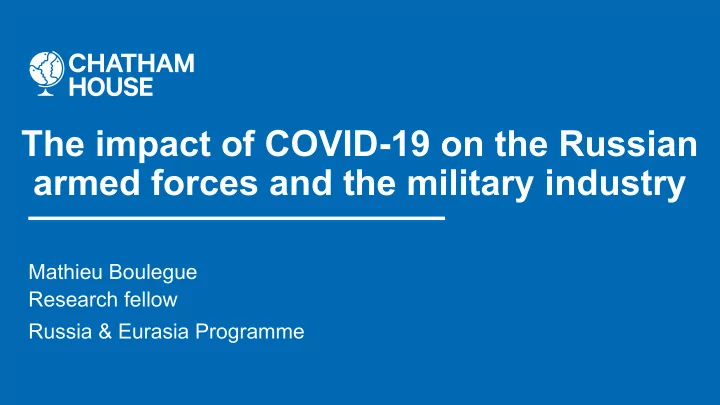

The impact of COVID-19 on the Russian armed forces and the military industry Mathieu Boulegue Research fellow Russia & Eurasia Programme
Shoigu interview for his 65th birthday on May 21: ‘The Russian armed forces must be mobile, modern and effective.’ Мобильная, современная, эффективная → Assessing the strong and weak signals for these three priorities in the context of Covid-19 and beyond. 2
3
MOBILE 4
1/ ‘Vectors’ of military strategy ‘Active defence’ - Mobile and fast - ‘Preemptive neutralisation of threats’ - Linked to the initial period of war and war termination strategy ‘Strategy of limited action’ - Mobile and sufficient - Out-of-area operations Need for increased C2, readiness and force mobility - Mobile and ready - Importance of military logistics Link with new military doctrine 2020? 5
2/ Command and Control, and beyond Lessons learned from Syria National Defence Control Centre (NDCC) Centralised standard procedures across C3 systems: - Tactical Joint Battle Command system - Joint Battlefield information system 6
3/ Logistics, readiness and prepositioning of force Linked to ‘preemptive neutralisation of threats’ Increased focus on force mobility and deployability Military logistics and pre-storage of equipment - Pushing potential tension and fighting away from the Russian territory - Reflected in procurement choices 7
MODERN 8
What does ‘modern’ mean? ‘New does not always mean modern’ Modernisation has two meanings: 1/ Procuring new systems (but not necessarily modern ones) 2/ MRO : upgrading proven Soviet-era platforms to make them (look) ‘modern’ ‘That’s modern!’ 9
1/ Impact of Covid-19 on OPK and GOZ OPK - military-industrial complex GOZ - state defence orders Putin: ‘unconditional fulfillment of the state defense order’ OPK adaptations: - Covid-19 specific output - Case of UPZ ventilators - In line with the ‘conversion’ of the military industry 10
2/ Trends in the OPK ‘Cheap, well and in time’ Long-term issues have been reinforced by Covid-19 Structural financial problems - Absence of liquidity - Financial recovery Stocks and production surge Impact of sanctions - Russia’s ‘Achilles’ Heels’: machine-building tools, microelectronics, special steels and metallurgic products - Replacing a dependency with another one (Asian markets) 11
3/ ‘Conversion’ of the OPK Conversion = civilianisation + diversification of OPK production Linked with import substitution programmes and investment programmes of the energy sector Caveats and limitations: - Initial capital investment - Market conditions 12
EFFECTIVE 13
1/ Impact of Covid-19 on the armed forces Highly centralised, top-down response Operational HQ Readiness checks Force organisation - CBRN troops - Intelligence posts Medical centres Drafting issues 14
‘Anybody ordered a car wash?’ 15
16
2/ Military science & technology ‘Ambiguous asymmetry’ of Russia’s military S&T ‘Good enough’ logic Seeking asymmetric advantages Example of ERA Military Innovation Technopolis ‘Degraded science’ 17
3/ Tactical adaptations // Artillery units revolution 2017 reform of the artillery units Reconnaissance-strike and reconnaissance-fire (RUK) multi-contour systems in combined arms manoeuvres Less carpeting, more PGMs Revival of the heavy self-propelled artillery systems 2S-7 Pion ISTAR revolution with UAVs 18
3/ Tactical adaptations // Electronic Warfare - 2008 wake-up call - Bylina automated C2 system - Increasing the tactical-operational capabilities of EW troops - Specialised EW research and production firms KRET and Sovzvezdie - Anti-UAV warfare // A2/AD capabilities - 4D, multi-layered, moving glass domes…not bubbles - Russian response to perceived asymmetry in air power with the West - Combination of coastal and air defence systems with stand-off strike capability - Beware of ‘ angry red circles ’ 19
3/ Tactical adaptations // Autonomous systems 2008 wake-up call and Syrian game-changer Unmanned Aerial Vehicles - ISTAR missions - Strike drone programme - S-70 Okhotnik and Altius - Troops integration at the tactical level Unmanned Ground Vehicles - Remote-controlled - Uran-6 deminer - UCGVs - Uran-9, Neherta Underwater Unmanned Vehicles 20
Orlan-10 21
S-70 Okhotnik strike drone 22
Uran-6 demining UGV 23
3/ Tactical adaptations // Doomsday weapons, Death Star systems & other Wunderwaffe The message IS the weapon How threatening are these systems to the West under the current Russian procurement cycle? Yu-71 Avangard (SS-X-31) hypersonic boost-glide system Kh-47M2 Kinzhal air-launched missile 9M730 Burevestnik (SSC-X-9 Skyfall) nuclear-powered subsonic cruise missile 24
Avangard 25
Kinzhal 26
Burevestnik 27
CONCLUSION What are we going to see next? - More of the same, but better - ‘Soviet on steroids’ - Lessons learned from Syria, Ukraine, and now Covid-19 - More mobile, modern and effective...but just ‘good enough’ What should the West do? - Maintain the military and technological edge over Russia - Avoid self-deterrence - Prioritize defence spending in breakthrough military technology and procurement where the West has a clear technological edge - Change the cost-benefit calculus of the Kremlin to operate in the grey zone 28
Valeriy Gerasimov smiling FOOTAGE NOT FOUND 29
Recommend
More recommend